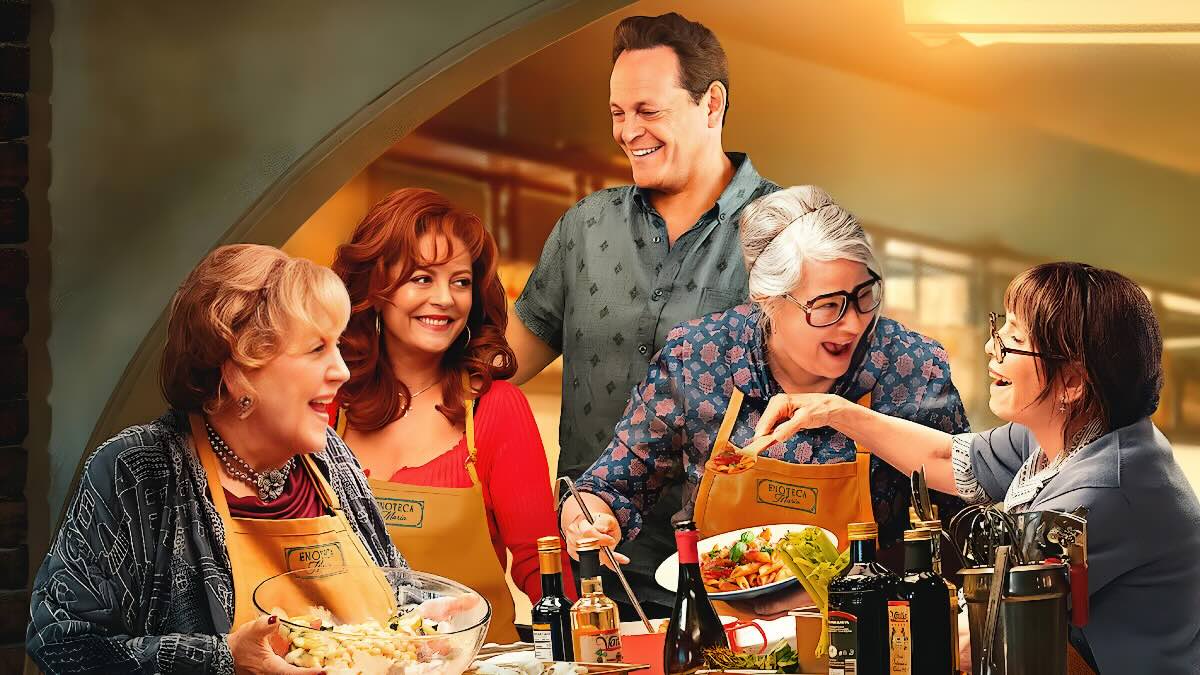TL;DR: Netflix’s Nonnas is a heartwarming dramedy that serves up comfort food for the soul. While it leans heavily on familiar tropes and a predictable narrative, the film shines through its charming performances, especially from its ensemble of seasoned actresses portraying spirited Italian grandmothers. It’s a delightful watch for those seeking a feel-good story about love, loss, and the unifying power of food.
Nonnas
In Nonnas, director Stephen Chbosky brings to life the true story of Joe Scaravella, portrayed by Vince Vaughn, who, after the death of his mother, opens a Staten Island restaurant staffed entirely by Italian grandmothers. Inspired by the real Enoteca Maria, the film is a celebration of heritage, community, and the recipes that bind generations.
The narrative follows Joe, an MTA worker, as he navigates grief and seeks solace in recreating his mother’s cherished dishes. With the encouragement of his friend Bruno (Joe Manganiello) and Bruno’s wife Stella (Drea de Matteo), Joe embarks on the ambitious journey of opening a restaurant that honors his mother’s memory. He recruits a quartet of nonnas: Roberta (Lorraine Bracco), Teresa (Talia Shire), Antonella (Brenda Vaccaro), and Gia (Susan Sarandon), each bringing their unique flair and stories to the kitchen.
The true stars of Nonnas are, unsurprisingly, the nonnas themselves. Bracco, Shire, Vaccaro, and Sarandon deliver performances brimming with warmth, humor, and authenticity. Their on-screen chemistry captures the essence of familial bonds, complete with playful bickering, shared memories, and the occasional food fight. These moments provide the film’s most genuine and touching scenes, offering a glimpse into the lives and histories of these vibrant women.
Sarandon’s Gia, a stylish hairdresser with a penchant for desserts, stands out with her vivacious energy and heartfelt monologues about beauty and aging. Bracco’s Roberta brings a gruff exterior that gradually softens, revealing layers of emotion and depth. Each nonna adds a distinct flavor to the narrative, making their collective presence the film’s most compelling ingredient.
While Nonnas offers a delightful premise and endearing characters, it doesn’t stray far from the expected. The storyline follows a familiar trajectory: a grieving protagonist finds purpose through a passion project, faces initial challenges, and ultimately achieves success and personal growth. The romantic subplot involving Joe and his high school sweetheart Olivia (Linda Cardellini) feels somewhat forced and underdeveloped, lacking the chemistry and depth to make it truly resonate.
Moreover, the film occasionally dips into clichés, with scenes that, while charming, feel reminiscent of other culinary-centered narratives. However, the sincerity of the performances and the genuine affection for the subject matter help to mitigate these shortcomings.
Cinematographer Jeong Park captures the essence of Italian-American cuisine with mouth-watering visuals of simmering sauces, freshly baked bread, and lovingly prepared dishes. These sequences not only tantalize the senses but also serve as metaphors for the film’s central themes of love, tradition, and the healing power of food.
The film’s soundtrack, featuring classic Italian tunes, further immerses viewers in the cultural tapestry of the story, enhancing the overall viewing experience.
Nonnas is a heartfelt tribute to the enduring bonds of family, the richness of cultural traditions, and the timeless comfort of a home-cooked meal. While it doesn’t break new ground narratively, its charm lies in its authenticity and the delightful performances of its ensemble cast. For those seeking a feel-good film that celebrates the warmth of community and the legacy of grandmothers, Nonnas is a satisfying choice.





